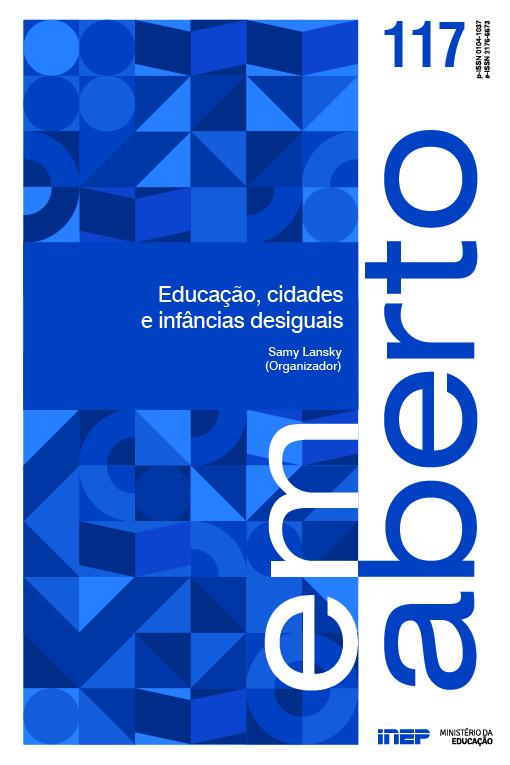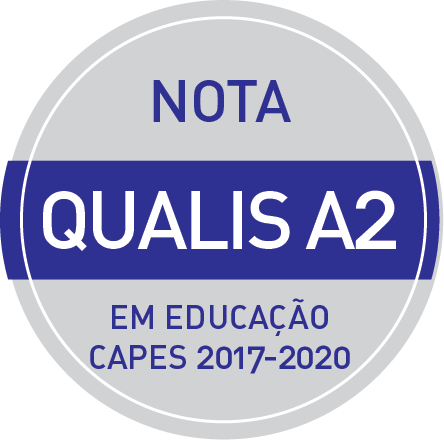Students’ wishes for their routes between home and school within Rio de Janeiro’s affective mapping
Abstract
This study seeks to discuss how socio-spatial inequalities that cross the experiences of Brazilian children had repercussions over the context of the pandemic, particularly on their relations with the territorial dimension and recreation. Analyses were carried out based on listening to children, ages 8 to 12, in the metropolitan area of Belo Horizonte (Minas Gerais, Brazil). Through data generated from a virtual questionnaire, photographs, and remote interviews, we reflect on how the pandemic reiterated historical inequalities and on how the diversity of children’s experiences was affected during social isolation, confronting the analyses of different territorial conditions and associated vulnerabilities. Affirming the recognition of children’s otherness and considering them as full-fledged social actors, we seek to reflect on their ability to build consistent interpretations about their experiences and the sanitary and social crisis.
Downloads
References
ARROYO, M. G. Imagens quebradas: trajetórias e tempos de alunos e mestres. Petrópolis: Vozes, 2004.
CARVALHO, L. D.; GOUVÊA, M. C. S.; FERNANDES, N. Crianças, infâncias e pandemia. Caderno Cedes, Campinas, v. 42, n. 118, p. 228-231, set./dez. 2022.
CARVALHO, L. D.; SILVA, R. C. Infâncias no campo: brinquedo, brincadeira e cultura. Childhood & Philosophy, Rio de Janeiro, v. 14, n. 29, p. 189-212, jan./abr. 2018.
CRUZ, S. H. V. (Org.). A criança fala: a escuta de crianças em pesquisas. 2. ed. São Paulo: Cortez, 2008.
FREITAS, D. M.; CANETTIERI, T. Metrópole, crise urbana e governança neoliberal. In: MENDONÇA, J. et al. (Org.). Reforma urbana e direito à cidade: Belo Horizonte. Rio de Janeiro: Letra Capital, 2022. Cap. 7, p. 97-106. (Série REURDC: Reforma Urbana e Direito à Cidade, 13).
FUNDO DAS NAÇÕES UNIDAS PARA A INFÂNCIA (UNICEF). Pobreza na infância e na adolescência. [S.l.]: Unicef, 2018. Disponível em: https://www.unicef.org/brazil/media/156/file/Pobreza_na_Infancia_e_na_Adolescencia.pdf. Acesso em: 30 ago. 2023.
GOUVÊA, M. C. S. Infantia: entre a anterioridade e a alteridade. Educação & Realidade, Porto Alegre, v. 36, n. 2, p. 547-567, maio/ago. 2011.
INSTITUTO BRASILEIRO DE GEOGRAFIA E ESTATÍSTICA (IBGE). Cidades e Estados. Rio de Janeiro, 2020. Disponível em: https://www.ibge.gov.br/cidades-e-estados. Acesso em: 28 mar. 2023.
JAMES, A. Embodied being(s): understanding the self and the body in childhood. In: PROUT, A. (Ed.). The body, childhood and society. London: Palgrave Macmillan, 2000. p. 19-37.
LARA, J. S.; CASTRO, L. R. Children’s responsibilities in a Brazilian community: citizenship as care practices. Global Studies of Childhood, [S. l.], v. 13, n. 1, p. 5-15, Jan. 2021.
NUNES, A. No tempo e no espaço: brincadeiras das crianças a’uwe-xavante. In: SILVA, A. L.; NUNES, A. (Org.). Crianças indígenas: ensaios antropológicos. São Paulo: Global, 2002. p. 64-100. (Série Antropologia e Educação).
OLIVEIRA, E. A. et al. Clinical characteristics and risk factors for death among hospitalized children and adolescents with covid-19 in Brazil: an analysis of a nationwide database. The Lancet: child & adolescent health, [S. l.], v. 5, n. 8, p. 559-568, Aug. 2021.
ORGANIZAÇÃO DAS NAÇÕES UNIDAS PARA A EDUCAÇÃO, A CIÊNCIA E A CULTURA (Unesco). Dois terços do ano acadêmico foram perdidos com o fechamento das escolas devido à covid-19. Brasília, DF, 27 jan. 2021. Disponível em: https://brasil.un.org/pt-br/109412-unesco%C2%A0dois-terços-do-ano-acadêmico-foram-perdidos-com-o-fechamento-das-escolas-devido-à. Acesso em: 30 ago. 2023.
PARGA, J. S. Orfandades infantiles y adolescentes: introducción a una sociología de la infancia. Quito: Abya Yala, 2004.
PREFEITURA DE BELO HORIZONTE. Região Administrativa de Belo Horizonte. Belo Horizonte, 2020. Disponível em: http://geonetwork.pbh.gov.br/geonetwork/srv/por/catalog.search;jsessionid=0DF72F928324A8F6F41C704142A37F9B.geonetwork1#/metadata/a597567f-cfcb-4bc8-97aa-e83793bbfae5. Acesso em: 28 de mar. 2023.
QUIJANO, A. Colonialidade do poder, eurocentrismo e América Latina. In: LANDER, E. (Org.). A colonialidade do saber: eurocentrismo e ciências sociais – perspectivas latino-americanas. Buenos Aires: Clacso, 2005. p. 227-278.
RAMA, A. A cidade das letras. São Paulo: Boitempo, 2015.
ROSEMBERG, F. Educação para quem? Ciência & Cultura, Campinas, v. 28, n. 12, p. 1466-1471, 1976.
ROSEMBERG, F. Políticas de educação infantil e avaliação. Cadernos de Pesquisa, São Paulo, v. 43, n. 148, p. 44-75, jan./abr. 2013.
SILVA, I. O. et al. Escutar as crianças em um contexto de crise: percurso metodológico e perfil dos participantes da pesquisa. In: SILVA, I. O. et al. (Org.). Infância e pandemia: escuta da experiência das crianças. Belo Horizonte: EdUFMG, 2022. p. 25-60. Disponível em: https://editoraufmg.com.br/#/pages/ebook/943. Acesso em: 1 ago. 2023.
SILVA, I. O.; LUZ, I. R.; CARVALHO, L. D. Infância e pandemia na região metropolitana de Belo Horizonte: primeiras análises. Belo Horizonte: EdUFMG, 2021.
TEBET, G.; ABRAMOWICZ, A.; LOPES, J. A make-believe confinement for Brazilian young children in the covid-19 pandemic. Children’s Geographies, Oxfordshire, v. 20, n. 4, p. 421-426, 2022.
Unesco ver Organização das Nações Unidas para a Educação, a Ciência e a Cultura.
Unicef ver Fundo das Nações Unidas para a Infância.

This work is licensed under a Creative Commons Attribution-NonCommercial 4.0 International License.
These are the terms of this Copyright Notice:
- I declare that I permanently forfeit in favor of the National Institute of Educational Studies and Research (INEP) all rights related to:
-
- editing, publication, reproduction, and distribution of the work;
- publication through digital and electronic media;
- translation of the work to any language;
- updating, re-printing, adaptation, and compression of the work;
- uploading of work in the publishing platform of INEP;
- divulging complete or parts of work through the World Wide Web (internet), whether in Brazil or foreign countries;
- authorization of third parties to execute any of the acts mentioned before.
- I explicitly declare that I am solely responsible for the opinions expressed in the work, and its publication does not violate the rights of third parties.
- I declare that the nature of said work is one of pro bono publico and, as such, I forfeit the right to any compensation regarding ownership rights granted.
- I authorize spelling and grammatical review of the manuscript, provided that the content and opinions therein remain unchanged.












